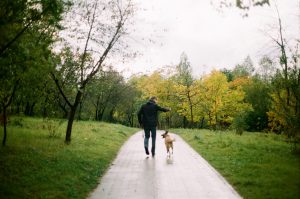What does “Living with COVID”
mean for workplace H&S?
In recent weeks, we have seen a change in the government’s approach to COVID-19. The focus has shifted towards a long-term strategy for living with the virus, favouring personal responsibility over legal mandates. As an employer, you will have to balance this against your legal duty of care towards employees and other people on site.
With this in mind, the government has published a new guide to reducing the spread of respiratory infections at work. Employers in England are no longer required to mention COVID-19 in their risk assessments, but there are still some steps you can take to keep infections down:
- Encourage employees to get vaccinated, and make it easy for them to do so. This could mean rearranging shifts or arranging cover so that workers can make it to a vaccination appointment.
- Keep the workplace well ventilated by opening doors and windows whenever possible. If you use a mechanical ventilation system, try to ensure that it is bringing in fresh air rather than recirculating air from indoors.
- Clean all workspaces thoroughly, especially surfaces that are frequently touched. Provide staff with all necessary cleaning supplies, including hot water, soap and hand sanitiser.
- Consider the needs of employees who might be at greater risk from COVID-19 or other respiratory illnesses. The government has issued specific guidance for this group, which you can access and make available to your staff.
You no longer need to report workplace outbreaks of COVID-19 to the government. However, if you find that you are experiencing high rates of respiratory illness, you may wish to review the guidance and see if there is room for improvement.
What about the rest of the UK?
The above guidelines apply to England. Businesses in Wales are still required to carry out a COVID-19 risk assessment, and to keep visitors informed of the safety precautions they are taking. Welsh businesses are also encouraged to allow high risk staff to work from home if possible.
In Scotland, the legal requirements are the same as in England, but with a greater emphasis on vigilance. A COVID-19 risk assessment is not mandatory, but it is strongly recommended. The Northern Irish government also recommends carrying out a risk assessment before allowing remote workers to return to the office.
For some employees, moving to less stringent restrictions will cause unease. It is important to be mindful of their concerns, and to do everything you can to reassure them that their safety remains a priority.
If you need any advice on getting the balance right in your business, we’re here to help.
Hospitality: Don’t forget to check your
outdoor installations this summer
The weather is getting warmer, and pubs and restaurants will be hoping for a busy summer. With the Commonwealth Games and the Queen’s Platinum Jubilee approaching, outdoor areas are likely to be packed throughout the season.
This is great news if you work in hospitality, but it does raise some safety issues. The HSE recently took the step of issuing a statement reminding businesses to carry out checks on outdoor electrical installations.
They recognise that there will be new installations which need to be fitted correctly, or older ones which are brought out of storage and require inspection for damage such as water ingress.
There are some simple steps you can take to ensure that your equipment is safe:
- Only install lights and heaters that have been designed for outdoor use.
- Check all equipment regularly for water damage.
- Arrange for a competent person to carry out all installations.
- Consider switching to low voltage or solar equipment.
- Make sure that your installation can accommodate all electrical equipment without the sockets or circuits becoming overloaded.
- Make sure that all sockets are in good condition and placed in locations where they can’t be damaged by customers.
- Switch off electricity before connecting new equipment.
- Keep heaters away from flammable materials.
- Keep packaging for winter storage, and always store equipment in a cool, dry place.
We hope good electrical installation to your outdoor spaces contributes to a safe and profitable summer. If you have any questions about health and safety in hospitality, don’t hesitate to give us a call.
Beware the consequences
Earlier in April, Sainsbury’s was fined £1 million after a customer was injured by one of its pandemic queuing systems. The customer suffered serious facial injuries after she drove her mobility scooter into a length of baler twine outside the supermarket’s Newbury branch.
The investigation found that Sainsbury’s had failed to perform any sort of risk assessment before installing the queueing system. In particular, it had not considered how the measures could affect disabled or visually impaired customers.
The pandemic was a stressful time for retailers, and many were forced to implement new safety measures at short notice. But this doesn’t absolve them from broader responsibility even if their situation attracts some sympathy.
The case highlights the importance of considering all foreseeable consequences/risks when planning new or changing activities. Even if you are creating measures in response to a specific danger, you mustn’t let this blind you to others.
8 Basic Health and Safety reminders
Even if you have more complex health and safety needs, it is a good idea to check in and make sure you are getting the basics right from time to time. Here are eight simple steps that every employer should take:
- Display the official HSE health and safety poster. Put this in a prominent position where it is visible to everyone. Alternatively, you can supply the equivalent leaflet to each staff member.
- Appoint a competent person to help oversee and manage workplace health and safety. This person should be competent and have the knowledge and skills to identify hazards and take steps to mitigate and control them.
- Make sure you have a fully stocked, in date first-aid kit, and appoint at least one member of staff to be in charge of it.
- Create a health and safety policy outlining your responsibilities as an employer, and the duties of your staff. If you have more than five employees, this must be written down.
- Report serious accidents and illnesses required by aRIDDOR. If you have more than ten employees, you must also record accidents in an accident book.
- Provide enough toilets, washbasins, and rest areas for your employees. Keep these areas clean, well-lit and properly ventilated, and ensure there are facilities for those with disabilities.
- Take out employer’s liability insurance to cover yourself in the event of an employee claim.
- Create detailed risk assessments, and update/review at least annually, or when something changes.
Remember that if you need help, we’re here to help.
Myth busters: Party poopers in the park
Parks are the perfect way to get some fresh air, but they also seem to be a magnet for unnecessary health and safety rules. From daffodil butchery to celebrity scandals, here are a couple of the worst offenders.
Where have all the flowers gone?
A Cornish town council removed more than 1,000 daffodils from a play area, citing fears that they could be poisonous to children. Locals were furious, calling the decision “preposterous” and “an act of vandalism”. Although it’s true that daffodils contain some toxic substances, removing them completely seems like an overreaction. The flowers had been there for years without causing any harm, so perhaps it would have been better to trust parents to keep their children from eating them.
This park has gone to the dogs
In a case that made national news, wardens at a London park refused to help popstar Will Young search for his lost dog. The singer asked several wardens if they could drive him around the park, but was refused on the grounds of health and safety. We understand Young’s frustration. While there may indeed have been legal reasons that the wardens couldn’t drive him around, it would’ve been better to explain these rather than repeating the tired old “health and safety” excuse.






